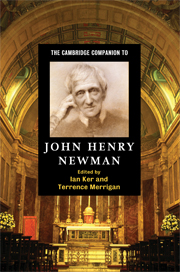2 - The Church Fathers
Published online by Cambridge University Press: 28 May 2009
Summary
When John Henry Newman looked for words and images to express his understanding of authentic Christian faith and practice, it seemed almost beyond question to him to reach for the writings of the theologians we generally call the 'Church Fathers': pastors, exegetes, polemicists, preachers who had witnessed - in Greek, Latin, Syriac, and a variety of other ancient languages - to a growing understanding of the full meaning of the Gospel during the first seven or eight centuries of Christian history. Newman, after all, was born an Anglican, living at a time of crucial importance for the development of the Anglican Church's self-understanding; in the wake of his friend John Keble's celebrated 'Assize Sermon' of 14 July 1833, he found himself caught up in a new movement in the Church, which consciously sought to present the Church of England as rooted in classical Christian doctrine, in the traditional structures of Church office and sacramental worship, yet in critical opposition to the central leadership and teaching authority of the Roman papacy - a via media or middle way, as Newman and his friends described it, between the Evangelical or liberal Protestantism of the time and Catholicism. Newman tells us, from the distant vantage point of his Apologia, written in 1865, that it was his own confidence in the unique position of the Church of England, as classically Catholic in its central beliefs and practices, but irreversibly opposed to the post-Reformation papal system, which drove him in the years after Keble's sermon to study the Church Fathers with new intensity and thoroughness: it was in the doctrines and worship of the 'primitive Church', Newman was convinced, expressed and regulated by the first four of the councils recognized by Christians as 'ecumenical' or universally authoritative, that Anglicans could find a common Christian identity with both Orthodox and Catholic Christians and with the doctrinally faithful communities of the Reformation.
- Type
- Chapter
- Information
- The Cambridge Companion to John Henry Newman , pp. 29 - 46Publisher: Cambridge University PressPrint publication year: 2009
- 1
- Cited by



